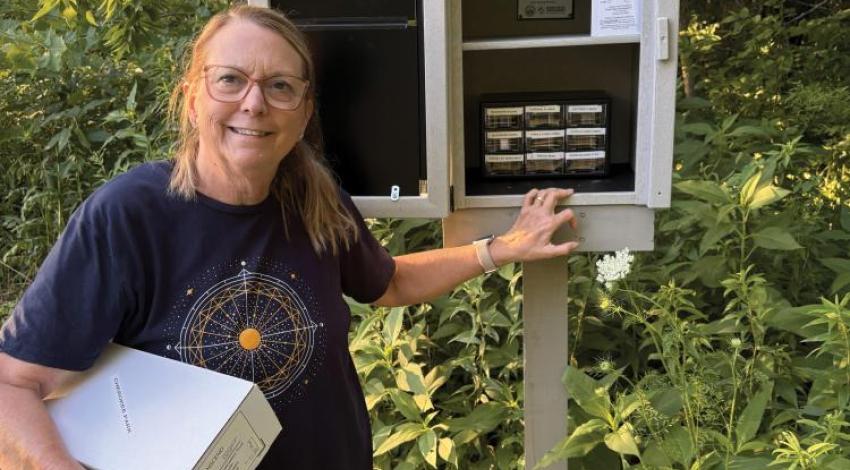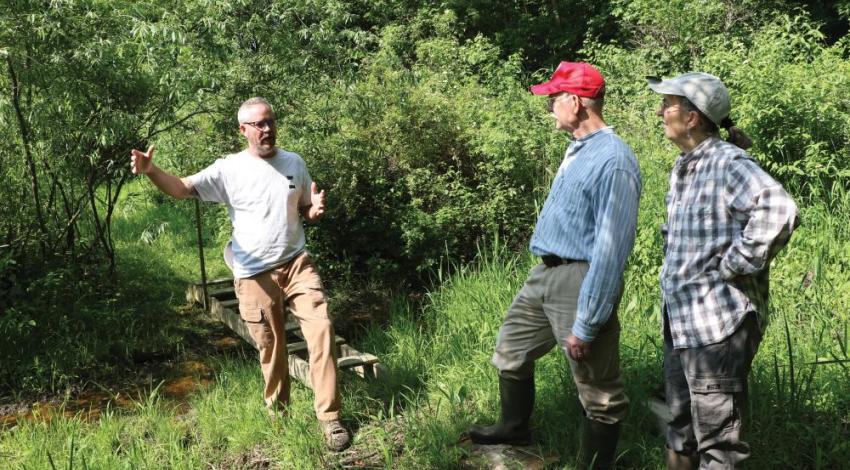(From left) Jessica and Tyler Basham, Josh and Cristen Fiebiger, and Jayne and Isaac Barnes
Some members of today’s younger generations — millennials and Gen Zers, if you will — favor a trendier, urban lifestyle, with conveniences like Uber rides and food trucks, bike-sharing, live entertainment, and ethnic eateries. But we found some young adults who prefer working the land, carrying on centuries-old legacies, rearing kids with an appreciation for nature, and growing acres (and acres!) of crops, raising livestock — even tending bees.
We talked to three young farm families — each of them a member of an Ohio electric cooperative. They’re among more than 30,200 farmers aged 44 and under across the state, according to 2017 USDA agriculture census data. Their numbers are growing. Five years prior, the same age group came in at about 26,300 farmers.
What’s it like to be a young farmer today?
Tyler and Jessica Basham
Guernsey-Muskingum Electric Cooperative
The rolling, 112-acre farm near New Concord has been part of Tyler Basham’s family for over a century — but the last family member to actually labor the land was his great-grandfather. Until now.
Tyler lives with his wife, Jessica, and their three young children in a pole-building-style home, from which he has happily taken over farm operations. His grandparents still live in the original farmhouse, and his parents also built a home on the property.
“The fields had been rented to neighbors for many years,” Tyler says, “but farming has always interested me.
I wanted to be self-sufficient. I enjoy being outside, and I’ve always liked equipment and animals.”
Put those interests together, and Tyler’s career was hatched. He had helped a neighbor farm in the past, but he admits he didn’t have an agriculture background. “I learned a lot just by doing it — and sometimes by doing it wrong the first time.”
Today, he raises show pigs and crop-farms hundreds of acres. His sows produce up to 150 piglets each year, sold in the spring to local 4-H kids who bid on the 12-week-old animals.
“Once the pig sale is over, we get out in the fields,” Tyler says. He plants corn and soybeans on 500 to 600 acres (his own plus rented fields). He also raises cattle.
He and Jessica — whose first date was at a tractor pull at the county fair — have a son, 6, and daughter, 4, who are “all about being outside,” Tyler says. Their newborn son, Dallas, is named after Tyler’s great-grandfather.
“I really enjoy farming — the whole lifestyle,” he says. “But it has its ups and downs like any job.”
Biggest struggle? “The weather. Without a doubt,” he says. “Anyone who works outside will tell you the weather is the most challenging thing. You have no control over it. But (the work) always gets done … even if we have to pull a few all-nighters.”
Josh and Cristen Fiebiger
Pioneer Electric Cooperative
Josh Fiebiger is the eighth generation of his family to farm land that straddles Miami, Shelby, and Champaign counties in western Ohio. A descendant of immigrants hailing from Caven County, Ireland, Josh and his family oversee row crops on their land, offer custom-application of crops, run a seed dealership, and raise beef cattle and show-calves.
“We all live close — Grandma and Grandpa live north, Dad lives south, and Cristen and I live right in the middle,” he says. The couple grew up in the close-knit farm community, and they were set up on their first date by their moms. They are now raising their 17-month-old son, the next generation of the farm family.
“Farming is really rewarding, especially when you have young kids,” Cristen says. “It’s good working together, but it can also mean long hours apart, depending on the day and the season. You can do a lot together as a family, though — our son even helped plant seeds this year.”
Josh is a big proponent of farm life. “I like everything about it,” he says. “It’s great to be able to be outside and work the land. You see the crops grow, see the livestock grow.”
At the same time, the things that make farming good are also sometimes a challenge. “You’ve got the weather and the pests to deal with,” he says. “But we’re working to improve nature, to improve the land. It’s very rewarding.”
Isaac and Jayne Barnes
South Central Power Company
Thirty-four million bees.
That’s right — 34 million. In 700 hives. Producing roughly 50,000 pounds of honey each year.
That sums up Isaac and Jayne Barnes’ Honeyrun Farm near Williamsport, about an hour south of Columbus.
The two both grew up in farming families, in different parts of the state. They met in college and now have four children — Mason, Maizy, Bridger, and Eden. Early in their courtship, Jayne gave Isaac a beehive for Christmas.
“He liked honey, he liked projects, and he liked science,” she says. The rest is history.
The two moved to Montana, where she went to grad school and he worked for a commercial beekeeper, who had a whopping 5,000 hives.
Back in Ohio, they settled on Isaac’s family land and set their sights on beekeeping. Before long, he quit his job as a high-school science teacher and the two established their thriving Honeyrun Farm.
Honeyrun has three “honey flows” a year, yielding different varieties of raw honey. Depending on what flowers the bees are visiting at the time, each is distinctive: a delicate, light spring honey; the mild and “typical” summer honey; and a dark, rich fall honey.
The farm also produces herbal-infused honey, handcrafted soap, lip balm and salves, and beeswax candles. Products are sold online and at central Ohio grocery stores and farm markets.
The Barnes also lend their bees to help pollinate other crops, trucking the hives during the night to fruit orchards and pumpkin patches. The bees orient themselves in the morning, do their job during the day, and return to the hives at night.
Like other farmers, Isaac says weather is the biggest challenge. “During a dry year, bees may produce 110 pounds of honey per hive. But in years that are rainy and wet, they might produce only about half that much. Looking back, I didn’t expect the years to be so variable.”
Even so, the family fully embraces their beekeeping endeavor. “I love working for myself and building our family business. Every day and every season are different,” Isaac says. “There’s a peacefulness that comes from this kind of work. You pay attention to the life around you.”
A little summer honey drizzled on toast in the morning isn’t bad either.









